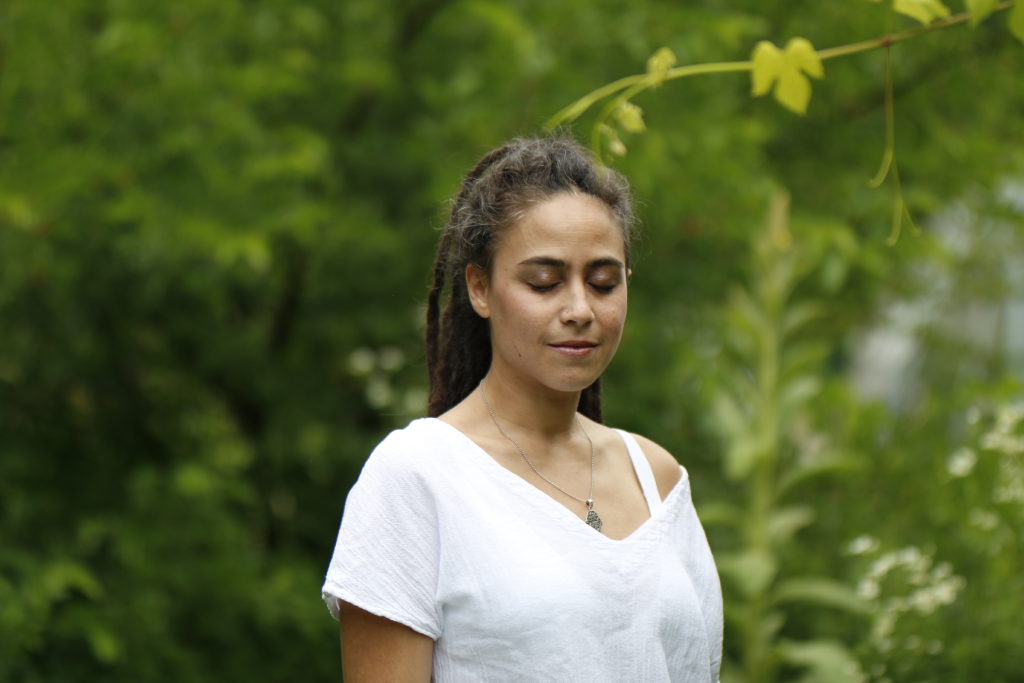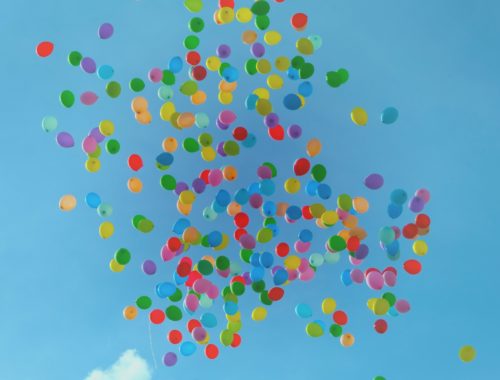
Building Identity through Community, Travel, and Spirituality
Keshira haLev Fife’s superpower is human connection. She’s originally from Pittsburgh, Pennsylvania and later lived in Sydney, Australia for 13 years becoming the country’s first Kohenet (Hebrew Priestess) in 2017. She radiates joy, light, warmth, and kindness. Keshira has traveled the world, fueled by her curiosity and devotion to personal growth and learning. Her spiritual path is guided by serving and supporting others while tending whole-heartedly to the Kohenet community. Here, Keshira shares more about her path of self-discovery, self-acceptance and living her bliss.
Let’s start by you sharing a bit about yourself with our readers.
I describe myself as a community weaver committed to reclaiming ancient practices in ways that are resonant and relevant in the modern day. I am passionate about building community, making life’s milestones meaningful, creating spaces for connection and prayerfulness, and working toward dismantling systems of oppression for the sake of collective liberation.
You grew up as the older daughter of a Jewish-American father and a Filipino mother. Can you tell us about how your childhood shaped your life journey?
Yes, the lineage from my father’s side is Ashkenazi, hailing from Belarus. My father is American born and I am the fifth generation born on his side. My mother’s lineage is primarily Filipino with Chinese and Japanese on her side. She came to America in 1975 and, on her side, I was the first person to be born here.
I was raised by two dramatically different people and, as a child, I felt like a connection point between two different backgrounds and personalities. Over time, that role morphed into “peacemaker” and I found myself contorting myself and hiding my own feelings, in order to make sure everyone else was OK. That way of being left an impression on me and I’ve come to realize that while it was difficult during my childhood, it ultimately gave me good training for what I do now. I learned the value of being able to translate what I hear into language or emotion or physicality, hugs, smiles into something that another person could understand.
I would often watch my parents talking and I could hear what they were both saying but they realized that couldn’t understand each other’s languages. Learning that skill from a young age has served me well as a Priestess because it’s linked in a lot of ways to what I do; walking between worlds and serving as a bridge.
Can you elaborate on the connection between the spiritual and the mundane?
Yes, however, there is a paradox here. On the one hand, everything has Spirit in it. Every human, every being, everything around us is infused with divinity either in its formation or its manifestation. I believe every human carries a divine spark. This is where our connection comes from, where our creativity comes from, how we receive insights, where our intuition lives, where our soul is anchored. At the same time, everything else around us – even mundane things – carry a Spirit as well. For example, plants, animals, and elements all seem to have an aliveness in them which carries Spirit. Some can argue that there is no separating between the spiritual and the mundane.
In Judaism, the way we mark and sanctify things is through time. We move in cycles of time: each week, each month, each year. We move in and out of sacred time and back into profane time. The most common example of this is on Friday night, we welcome the Jewish Sabbath. It comes at sunset and through song, ritual, and prayer we enter what we understand is a sanctuary of time, a suspension between the week that has passed, in which we did things that were for better or for worse, and the week ahead in which the same will happen. But during Shabbat, from when the sun comes down on Friday night until Saturday night when we see three stars in the sky, this time is sacred. This pause gives us space to breathe and reflect outside of the busyness of the daily grind and gives us time to fully be in the present with ourselves and each other.
What propelled you to deepen your connection with your Jewish faith?
I’ve always been deeply connected to Judaism as integral to my identity, but a couple of things happened which deepened my commitment and then my devotion to my spiritual life.
First, back in 2003, I had a ritual conversion that largely had to do with the fact that my beloved, Tim, was converting to Judaism. We felt strongly that this was an important journey that we wanted to do together. Therefore, I choose to participate in the ritual aspect of conversion on the same day, as an affirmation of walking this path together. This allowed us to share something profound that marked the beginning of our Jewish journey together.
Second, I made the decision to become a Kohenet (a spiritual leader for women on a Jewish path); and to receive transmission to become a Hebrew Priestess. While my story is long, I’m happy to share a couple of my favorite highlights.
Deep down, I’ve known what I wanted to be since I was 5 years old. When I was in kindergarten each one of us had to stand up, say our name and what we wanted to be when we grew up. I don’t even know why or how I would know to say this, but I stood up and said that I wanted to be a Rabbi. I still marvel at this memory.
Fast forward 30 years and I found myself at a crossroads asking big questions like “what am I here for?” and “what would it look like to live a purpose-driven life?” This led me to stillness, silence, reflection, meditation, and prayer. What came to me was the resounding message that I was here to lead from a heart-centered place – to teach and learn, to share and listen, to guide and facilitate and help and support. In short, to be of service.
We met in 2008 in Australia and shortly thereafter you and your beloved, Tim, took a one-year plus journey around the world. What were some of your biggest takeaways from this experience?
Honestly, it was one of the most transformative experiences of my life.
When Tim and I first moved to Australia, our original plan was to stay for one year and then take a month off and travel around, slowly making our journey back home to Pittsburgh. At that time, a month seemed like an endless amount of time to us.
However, we found that it’s standard for Australians to go on holiday for weeks, months, and even years sometimes. The gap year is a cultural tradition and we wanted in on the action. As we started dreaming of where our adventures might take us, Tim’s employer asked him to extend his contract and, while he was keen to do that, we didn’t want our dream trip to fall by the wayside. Luckily, the company was happy to oblige, knowing that he would return a year later.
Coincidentally, we realized that the timing of this journey happened to be 7 years after Tim began working there. It was 7 years later that we found ourselves embarking on this year-long trip that turned into 15 months. During the trip and through our spiritual practice, we came to understand more deeply in Judaism that there is a biblical period called shmita (meaning, literally, release). Mirroring the Sabbath (where we rest on the seventh day), this principle is applied to agricultural cycles and there is an imperative of release every 7 years. In ancient times, people would stop farming for a year and let their land lie fallow. They would release any indentured workers, any debts, they would spend a year allowing for rest, in order to allow things to regenerate and begin anew. Therefore, we set our intention to release, to let go of routine and habit, and formation of things that we were doing by default or unconsciously. This would allow us to recenter, reconnect, rejuvenate and be ready with a clear vision of how to plan our next 7 years.

We have now done this twice. Our second travel journey was only for 6 months, and the inquiry that arose that time around was about how we know when to stand in conviction and when to go with the flow. We poured over this topic endlessly during our travels and still go back to this question when life throws curveballs at us, or when we find it hard to gain traction in some area of life.
In both cases, the context was life-changing for us because it gives a regular reminder (every 7 years) of all things to put into perspective. It gives us the opportunity to evaluate our lives and the freedom to let go of things that no longer serve us.
The travel itself was life changing. To physically be in very different parts of the world challenged us to unlearn some of our beliefs and perceptions of the world that we were taught growing up. Our journey invited us to consider what happens in cultures where people live multi-generationally. What happens in countries where healthcare and education are entitlements and expected by all citizens? What happens where people follow agricultural cycles and rest in darkness and are awake when it’s light? What do we know ancestrally that we have forgotten or suppressed? What would we like to reclaim?
The gift of being present with all these questions outside of the daily grind was absolutely a once in a lifetime opportunity. Travel is a huge part of our lives for so many reasons. And, even though we have traveled since and will travel more, we have not yet been able to replicate the depth of the original trip and feelings of lightness and spaciousness that manifested from that experience.
Can you describe how you found your spiritual calling?
In retrospect, I didn’t really “find” my spiritual calling so much as I answered the call.
The whispers have been there since I was young and one pivotal moment stands out in my mind. When my parents were separated and going through a divorce, neither one of them had the capacity to focus on summer plans for my sister and me. I remember, one day, someone from the Jewish Community Center called and asked if we were planning to return to camp that summer. My mom said that she wasn’t really in a place to think about camp details for us and the person insisted that, if we wanted to spend the month at camp, she should just send us. The details would be sorted out later. So, my sister and I went to camp which was wonderful for us because we didn’t have to be exposed to what was going on at home. I remember thinking after I came back; I live in an amazing community, but it is only amazing because people in the community make it that way. Being on the receiving end of this generosity meant so much to me at the time and I have carried this memory with me for years; knowing I would reciprocate this in some way.
In 2011, I fell ill. Months of treatment culminated with an announcement that I was officially “fine”, but I nonetheless ended up having a nervous system breakdown quickly followed by an existential crisis. This experience left me overwhelmed and emotionally broken but the care and tending from my community kept me going. I was stunned to know that congregants that I had only met once were visiting me, caring for me and feeding me all while making me a part of their beautiful community. As I lay convalescing and reflecting, I realized this was an invitation to review how I was living and to listen once again for the call. In these moments, I resolved that if I got well and strong again that I would be an active participant in my community. And that is exactly what I did. I accepted an invitation to join the board of North Shore Temple Emanuel when I was still healing.
After about a year, I was asked to stand for election as President of the Board of Directors, a position I then held for 21 months. I didn’t finish the second term as I reached an impasse where I realized I was no longer the right fit. My personal growth was slow and stagnant, and I felt motionless, and worse yet, I felt that I didn’t have anything left to contribute. So, as gracefully as I could, I resigned to make space for someone else to lead. It wasn’t the way I would have chosen to write the ending and I realized only years later that it wasn’t just an ending but also a beginning. When I left, I was able to dive more deeply into my studies toward ordination as a Hebrew Priestess and to focus on launching and building Kesher Sydney and then Kesher Pittsburgh, two communities which were founded with the intention of creating a connective space where people could come together to welcome Shabbat and step into sacred time. Both Kesher communities have evolved significantly since then and I am grateful for what they continue to become.

What did you learn from that difficult decision to step down as President of the Board?
First and foremost, I’ve learned that my body and my being know what’s right for me and that it’s imperative that I listened. When I left, I gained a sense of ease in my body and felt more lightness in my being. However, even with that awareness, it wasn’t so easy! There was serious ego going on in this situation because although I knew what I needed to do, my ego was focused on the reactions of other people. The pressure to follow through and finish my tenure was intense. My father used to say quitters never win and winners never quit, and I could feel myself contorting in harmful ways, all to avoid disappointing others.
I was visiting a friend and who listened intently to what was happening. My mind was busily trying to figure out what to do or, more to the point, how to make it through the next three months, let alone run for a third term. At some point, she said, “I have an idea – why don’t you write a resignation letter? That way you can get it all out of your head and then see how you feel afterward.” It was so cathartic to sit and write that letter and to read it aloud to my friend. When I was done, I shocked both of us by sending it right then and there. I remember sleeping so well that night.
One lesson which was reinforced by this experience was that when I say “yes” to something, I’m inherently saying “no” to something else. Or, in this case, by saying “no more” to something, I created the space to say “yes” to another opportunity.
I also learned the value of continually stripping away all the excess – even when it’s hard – so that I can accept myself and be real, present and vulnerable. That to be of service includes simply offering myself as a listening companion with a willingness to share where I’ve been and what I’ve experienced even when it’s not been pretty.
You later became Australia’s first Hebrew Priestess in 2017. How did you know that was the right path to follow?
I’ve had a few experiences in my life where something was so right, I never had a moment of doubt – this was one of those times. The rightness of this part was confirmed for me since, almost immediately, everything started to flow well again. I was able to immerse myself in my studies and allocate more time to other things in my life in ways that felt easeful. I was humble enough to step down and resilient enough to withstand the criticism that I faced due to my decision. I trusted myself enough to walk the next step on my path even if I didn’t know where the staircase was going.
My Hebrew Priestess training was personally and spiritually rigorous. It was a lot of work and I felt accomplished and grateful that it all came to fruition. In addition, I was able to be in Australia and be supportive of Tim and his career while being able to spend time in my home community twice each year when I traveled to the US for my intensive training.
After 13 years in Sydney, you moved back to Pittsburgh. What place do you consider home and why?
My home is both places. Pittsburgh is the place where I belong and that claims me, and Sydney is a place which has welcomed and held us in such wonderful ways and will always have a place near and dear to my heart.
It was a long journey and the right decision for us to return to Pittsburgh. One thing we came to realize in Sydney is that we stayed so long that we maybe stayed too long. For example, several things began to happen. I started to feel disintegrated because I was traveling so much. And, while I considered both places to be my homes, I was never in one place for very long, so people started to treat me like a guest no matter where I was. It was neither sustainable nor desirable. So, we had to make a hard choice and do what we thought was best for the next phase of our lives. We chose to be in our home community of Pittsburgh, close to our elders and youngers and dear ones whose lives are so intrinsically connected to ours.
We intentionally arrived back in time for my father’s second Bar Mitzvah. In Judaism, 70 years is considered a full life. He was turning 83, which means that he had lived a full life plus 13 years and so, in a way, he was coming of age again. We were celebrating the fullness of his life and he chose to affirm his Jewish path. He honored me by asking me to read from the Torah to mark the occasion.
This beautiful and memorable experience for our family happened only a few weeks before our community was devastated by the mass shooting at Tree of Life Synagogue. Though Tree of Life isn’t currently our congregation, I grew up there and many milestones in my own life were celebrated there. In fact, my beloved and I were married in the chapel where the shooting took place. As difficult and sad as it’s been to be here at times, I believe it was divine timing that we were back in Pittsburgh to offer support and stand in solidarity in its aftermath.
How is your community doing?
It has been extraordinarily difficult, very emotional and entirely inspiring – around here, we say that we are a steel city, we may bend but we’ll never break.
Some folks have moved on, gone back to work, resumed life and business as usual. Other folks are still very much present with grief, trauma, stress, and supporting others. Some of us are still in between. What I’ve tried to impart to my community is that, while they certainly don’t need my permission, sometimes it’s helpful to be reminded that whatever emotion we’re experiencing, and however we’re processing what has occurred, is OK. Each of us is different and there is no wrong way to feel following such a tragic event.
At the same time, I have been so inspired by the ways that people have come together to support one another both within the Pittsburgh Jewish community and beyond. We have felt such support from folks locally and across the globe and it has taught us a lot about how to be better neighbors and allies.
How are you taking care of yourself so you can continue to serve others?
I love this question. I read an article maybe a year and a half ago, which said that self-care is not about taking bubble baths. Self-care is about creating the kind of life that we don’t need to escape from. In short, self-indulgence and self-care are two different things.
This hits home for me now. My self-care is a constant cultivation every time I make a choice to say yes or no to something. And asking myself, is this the kind of life I want to be living? In service of what/whom am I doing this? What do I have to give up to say “yes” to this? Does this help me advance toward my ultimate goals? This has been fundamental and a way I guide everything that I do. Otherwise, other forces – whether external or ego forces – get in the way of me really being my best self and living my best life.
On a practical note, I am doing my best to sleep a full night, every night. To meditate, to allow me time for three meals each day, to make space for relaxation and laughter. I have also made it a personal practice to find the right pace, to stop rushing and to dismantle urgency. And, when things don’t happen perfectly every single day, I try not to be hard on myself. This alone is a supreme act of resistance and self-care.

What or who inspires you? Why?
To be honest, Everybody. I think when I approach the world looking for a spark of divinity in people, I find them. It’s easy to forget to do that in the busyness of life. At the simplest level, inspiration can be found everywhere. In a more sentimental way, my beloved inspires me all the time. He leads from a place of generous spirit; he desires the best for everyone around him and acts accordingly. For me, that’s a discipline and for him, it just comes naturally, and I feel grateful to have him as a constant reminder of how it’s possible to be.
I am also inspired by folks who are engaged even when it’s easier to do something else. The ones who really show up, stand for what they believe, and speak their truths, powerfully and gracefully, even when it’s not popular. I aspire to dismantle systems of oppression and work toward collective liberation in these ways.
In closing, what are 3 simple joys are part of your daily routine?
- A practice of starting my morning in prayer and knowing that doing so sets me on solid ground and in a centered place from which to serve.
- At the end of the day when I lie down at night feeling into my body, relishing it, thanking it for all the ways it supported me throughout the day and then letting it rest easy.
- Looking out the window and seeing what I can learn from the weather, nature and what’s all around me. Taking a few moments to gaze without any action items.
To learn more about Keshira and the work that she does – leading prayer gatherings and officiating life spiral ceremonies – visit her website.
To learn more about the Kohenet Institute please visit their website.
*Photos courtesy of Keshira haLev Fife.
You May Also Like

Celebrating a magnificent year
November 2, 2019
For the love of stories
January 7, 2020

